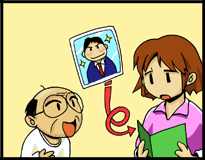The Omiai - Et tu, America?
 From Wikipedia: "Omiai (Japanese: お見合い) or miai (the o is honorific) is a Japanese custom whereby unattached individuals are introduced to each other to consider the possibility of marriage."
From Wikipedia: "Omiai (Japanese: お見合い) or miai (the o is honorific) is a Japanese custom whereby unattached individuals are introduced to each other to consider the possibility of marriage."
For the longest time, I've only read about 0miai (pronounced oh me eye) in cultural textbooks of Eastern Asia. China, Japan, India (to name some of the largest practicioners) have this concept imbued into their societies. In fact, these omiai's aren't just some traditional practice- they're an industry.
Yes, there's billion-dollar industries in these countries striving upon shy (and/or socially exhausted) people who desire to date, and perhaps even more. Japan has gotten the tech-side of this tradition down by making omiai "stations", where after selecting specific criteria, one sits in a booth and selects photos of potential dates-to-be. Then, a Blind Date-esque movie plays, and they get a biographical introduction of the selected person. I always got a chuckle out of this- it was perhaps one of the laziest (yet innovative!) ways to hook up with someone yet.
But then, online dating services burst into the American mainstream...
At first, people using this service were few and far between. As the service's convenience proved its worth in busy peoples' lives, however, it was only a matter of 3 to 6 years before Americans made this a cultural phenomenon. 3 to 6 years is all it took to abate the "over-30 bar-going singles", a good portion of AOL/Yahoo! dating chatrooms, and many of real life's spontaneous "lust" moments. People no longer had to be attentive (or active) to have a successful love life. By going online and signing up for a dating website, the work was taken care of for them.
Soon, however, there were scandals abound of falsification of information on e-dating websites. As more websites joined the profitable market, amateurish services required much less stringent joining processes. Some were just "hook-up" websites, meant to solely "match horny male A with horny female B". It wasn't long till the inevitable occured: people lied about their age/marital status/past conviction records. From a story I read earlier this year, one woman was unfortunate enough to go out on a series of three dates with a man she met online, only to Google his name to see his long-standing list of crimes. This is just one of the stories. For nearly the entire time dating websites have been in the mainstream, there have been constant lawsuits against them for not verifying other users' data.
This hasn't been some tangent American dating website history. These all lead up to my point: America... you're adapting the omiai as well?
Yes, straight from Wired.com, this article shows how online dating in America now rounds out the definition of an omiai. Whereas online dating "services" were just the data servers performing algorithms, you now have real, physical people helping you weave through the confusion that is the online dating world. These hired dating professionals are capitalizing on the current fears of online fraudulence, and do so by taking a page out of the "omiai" book.
Let's compare the purposes of an omiai to these new professionals:
If you can't find a difference, it's because there is none. The only noticable difference between the traditional omiai of Japan versus this American rendition is that the American service will not follow you out on a date.
This strikes me as extremely out of the ordinary. America generally prides itself on breaking away from these "arranged meetings" which the omiai embodies. Now we're embracing it with open arms, without any skepticism, simply because it's veiled by another medium. We look down upon matchmaking/arranged marriages originally because it consituted a lack of effort, or alternatively, relationship apathy. Being apathetic towards finding a relationship, yet wanting one- in the same heartbeat- typically does not mix.
Yet online, we view this differently. We see the Internet's social capabilities, whether we admit it or not, to be nearly tangible. Yet that little ambiguity- that slight aspect that makes us feel online interaction is something "fake"- makes things unmentionable offline entirely acceptable online (essentially, exploiting Internet anonymity). We can drop what society has called wrong and go about things the way that interest us with no worry of social reprocussion. Matchmaking online is now perfectly possible, whereas real-life matchmaking is ominously taboo.
The future of the online dating industry in America is already set out, so it seems. The industry is booming, memberships are growing by the hour, and little by little this form of dating is becoming the acceptable norm. Eventually, we need to stop ourselves and ask: Am I doing too little with my love life? Is letting a service determine who I meet a good thing? Why am I resorting to something that has been scrutinized by Americans for decades?
If we don't ask this, we may forget why we ditched matchmaking in the first place. As history teaches: don't make the same mistake twice.

No comments:
Post a Comment